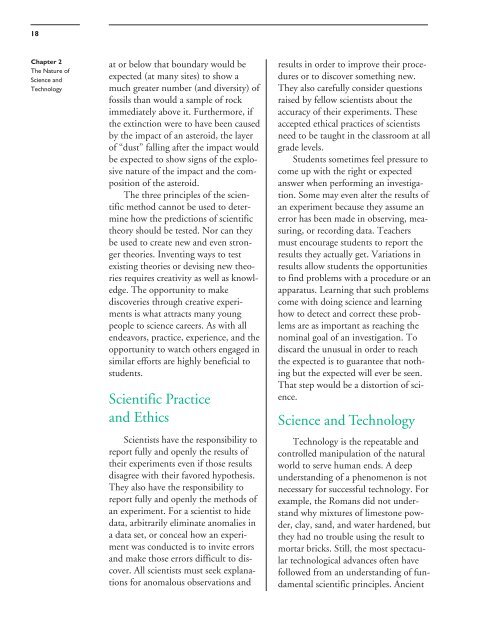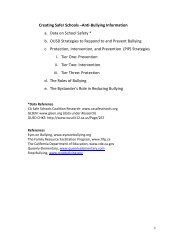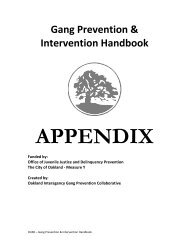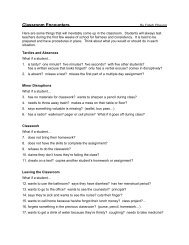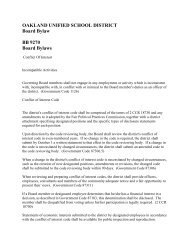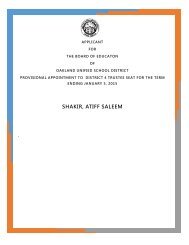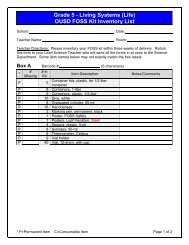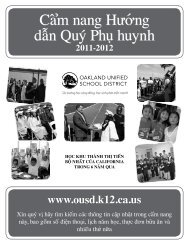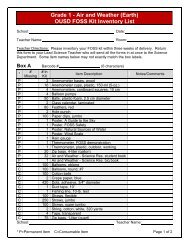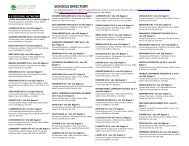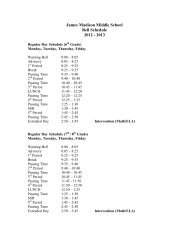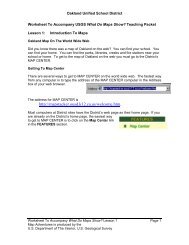Science Framework, part 1 - Free Downloads (CA Dept of Education)
Science Framework, part 1 - Free Downloads (CA Dept of Education)
Science Framework, part 1 - Free Downloads (CA Dept of Education)
- No tags were found...
Create successful ePaper yourself
Turn your PDF publications into a flip-book with our unique Google optimized e-Paper software.
18Chapter 2The Nature <strong>of</strong><strong>Science</strong> andTechnologyat or below that boundary would beexpected (at many sites) to show amuch greater number (and diversity) <strong>of</strong>fossils than would a sample <strong>of</strong> rockimmediately above it. Furthermore, ifthe extinction were to have been causedby the impact <strong>of</strong> an asteroid, the layer<strong>of</strong> “dust” falling after the impact wouldbe expected to show signs <strong>of</strong> the explosivenature <strong>of</strong> the impact and the composition<strong>of</strong> the asteroid.The three principles <strong>of</strong> the scientificmethod cannot be used to determinehow the predictions <strong>of</strong> scientifictheory should be tested. Nor can theybe used to create new and even strongertheories. Inventing ways to testexisting theories or devising new theoriesrequires creativity as well as knowledge.The opportunity to makediscoveries through creative experimentsis what attracts many youngpeople to science careers. As with allendeavors, practice, experience, and theopportunity to watch others engaged insimilar efforts are highly beneficial tostudents.Scientific Practiceand EthicsScientists have the responsibility toreport fully and openly the results <strong>of</strong>their experiments even if those resultsdisagree with their favored hypothesis.They also have the responsibility toreport fully and openly the methods <strong>of</strong>an experiment. For a scientist to hidedata, arbitrarily eliminate anomalies ina data set, or conceal how an experimentwas conducted is to invite errorsand make those errors difficult to discover.All scientists must seek explanationsfor anomalous observations andresults in order to improve their proceduresor to discover something new.They also carefully consider questionsraised by fellow scientists about theaccuracy <strong>of</strong> their experiments. Theseaccepted ethical practices <strong>of</strong> scientistsneed to be taught in the classroom at allgrade levels.Students sometimes feel pressure tocome up with the right or expectedanswer when performing an investigation.Some may even alter the results <strong>of</strong>an experiment because they assume anerror has been made in observing, measuring,or recording data. Teachersmust encourage students to report theresults they actually get. Variations inresults allow students the opportunitiesto find problems with a procedure or anapparatus. Learning that such problemscome with doing science and learninghow to detect and correct these problemsare as important as reaching thenominal goal <strong>of</strong> an investigation. Todiscard the unusual in order to reachthe expected is to guarantee that nothingbut the expected will ever be seen.That step would be a distortion <strong>of</strong> science.<strong>Science</strong> and TechnologyTechnology is the repeatable andcontrolled manipulation <strong>of</strong> the naturalworld to serve human ends. A deepunderstanding <strong>of</strong> a phenomenon is notnecessary for successful technology. Forexample, the Romans did not understandwhy mixtures <strong>of</strong> limestone powder,clay, sand, and water hardened, butthey had no trouble using the result tomortar bricks. Still, the most spectaculartechnological advances <strong>of</strong>ten havefollowed from an understanding <strong>of</strong> fundamentalscientific principles. Ancient


